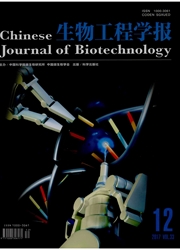

 中文摘要:
中文摘要:
楸树内生真菌菌株FSN002次生代谢产物楸灵素具有优良的抗肝癌性能,选育突变株是研究楸灵素生物合成机制的重要手段。真菌孢子预培养13 h左右,萌发形成4–6个细胞的幼嫩菌丝,适合作为紫外诱变的出发材料。实验发现紫外光强度和照射时间对真菌致死率的影响符合线性模型,二者之间不存在明显的交互作用。当紫外光强度为90 000μJ/cm~2,时长为6 s时,真菌的致死率在95%左右。在上述优化选育诱变条件下,获得了1株楸灵素合成能力完全丧失的突变株和1株楸灵素合成能力下降到野生型16%的突变株,为下一步研究楸灵素的生物合成机制以及高效生产楸灵素奠定了基础。
 英文摘要:
英文摘要:
Secondary metabolites of endophytic fungi FSN002 from Juglans mandshurica Maxim have excellent liver cancer resistance. Preparation of mutant strains is an important means to study the biosynthesis mechanism of catalitaxol.Fungal spores germinating young hyphae with 4 to 6 cells after culturing for 13 hours were used as starting materials of ultraviolet (UV) mutagenesis. UV light intensity and irradiation time have a linear relationship with fungal mortality. The two factors had no obvious interactions. When UV light was 90 000 pJ/cm2 and irradiation time for 6 s, the mortality of fungi was around 95%. Under the optimization mutation condition, two mutant strains were obtained, of which one lost the synthesis ability of catalitaxol completely, and the another synthetized only 16% catalitaxol of the wild strain. Our findings may serve basis for further study on the biosynthesis mechanism and efficient production of catalitaxol
 同期刊论文项目
同期刊论文项目
 同项目期刊论文
同项目期刊论文
 Molecular cloning and functional expression analysis of a new gene encoding geranylgeranyl diphospha
Molecular cloning and functional expression analysis of a new gene encoding geranylgeranyl diphospha Generation of tobacco lines with widely different reduction in nicotine levels via RNA silencing app
Generation of tobacco lines with widely different reduction in nicotine levels via RNA silencing app 期刊信息
期刊信息
